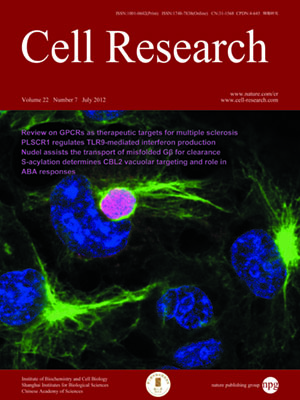
Volume 22, No 7, Jul 2012
ISSN: 1001-0602
EISSN: 1748-7838 2018
impact factor 17.848*
(Clarivate Analytics, 2019)
Volume 22 Issue 7, July 2012: 1181-1198
ORIGINAL ARTICLES
ROS-induced DNA damage and PARP-1 are required for optimal induction of starvation-induced autophagy
José Manuel Rodríguez-Vargas1, María José Ruiz-Magaña2, Carmen Ruiz-Ruiz2, Jara Majuelos-Melguizo1, Andre韓a Peralta-Leal1, María Isabel Rodríguez<
1Instituto de Parasitología y Biomedicina López Neyra, CSIC, Avda. Conocimiento s/n, 18100 Armilla, Granada, Spain
2IBIMER, Universidad de Granada, Granada, Spain
3CIBERED, Hospital Universitario san Cecilio, Granada, Spain
4Departamento de Ciencias Experimentales, Universidad de Ja閚, Ja閚, Spain
5CABIMER, CSIC, Sevilla, Spain
6Danish Cancer Society Institute of Cancer Biology, Strandboulevarden 49, Copenhagen DK-2100, Denmark
Correspondence: F Javier Oliver,(joliver@ipb.csic.es)
In response to nutrient stress, cells start an autophagy program that can lead to adaptation or death. The mechanisms underlying the signaling from starvation to the initiation of autophagy are not fully understood. In the current study we show that the absence or inactivation of PARP-1 strongly delays starvation-induced autophagy. We have found that DNA damage is an early event of starvation-induced autophagy as measured by ?-H2AX accumulation and comet assay, with PARP-1 knockout cells displaying a reduction in both parameters. During starvation, ROS-induced DNA damage activates PARP-1, leading to ATP depletion (an early event after nutrient deprivation). The absence of PARP-1 blunted AMPK activation and prevented the complete loss of mTOR activity, leading to a delay in autophagy. PARP-1 depletion favors apoptosis in starved cells, suggesting a pro-survival role of autophagy and PARP-1 activation after nutrient deprivation. In vivo results show that neonates of PARP-1 mutant mice subjected to acute starvation, also display deficient liver autophagy, implying a physiological role for PARP-1 in starvation-induced autophagy. Thus, the PARP signaling pathway is a key regulator of the initial steps of autophagy commitment following starvation.
Cell Research (2012) 22:1181-1198. doi:10.1038/cr.2012.70; pulished online 24 April 2012
FULL TEXT | PDF
Browse 2222


